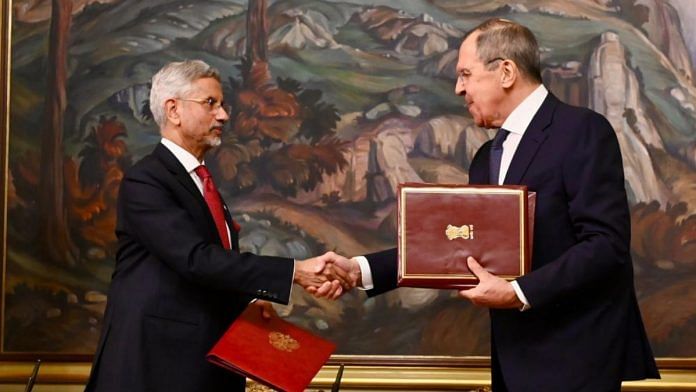New Delhi: India and Russia have agreed to establish the Chennai-Vladivostok maritime corridor, in a breakthrough for ties between Moscow and New Delhi, Russian Foreign Minister Sergey Lavrov announced Wednesday.
“We have paid special attention to the matters of building up practical cooperation. In addition to the agreements that have been reached yesterday [Tuesday]…Today we have agreed upon a number of steps that will allow us to expand cooperation including in the context of the upcoming launch of the International North-South Transport Corridor, the establishment of the Chennai-Vladivostok route and the cooperation on exploration of the Northern Sea route,” Lavrov said during a joint press conference held with India’s External Affairs Minister S. Jaishankar in Moscow.
Jaishankar reached Moscow Monday for a five-day visit to Russia.
The International North-South Transport Corridor (INSTC) and the Chennai-Vladivostok, or Eastern Maritime Corridor, would ensure transportation corridors between both the Western and Eastern coasts of India with Russia.
While Lavrov Wednesday spoke of the “launch” of the INSTC, the corridor has already been used last year for the first time to transport India-bound Russian cargo.
The INSTC was established in September 2002 between Iran, India and Russia. The 7,200-kilometre-long multi-modal transportation corridor facilitates the movement of freight between Afghanistan, Armenia, Azerbaijan, Russia, Central Asia and Europe, besides Iran and India as reported by ThePrint earlier.
Both India and Iran back the project, with New Delhi proposing to include Chabahar port, which it has been developing with Iran, to the INSTC framework. The first India-bound Russian cargo — sent by train for the first time using the transportation corridor — reached Iran last year, having covered roughly 3,800 kilometres through Kazakhstan and Turkmenistan before being sent to India over sea.
Jaishankar and Lavrov also agreed to expand the “legal framework” of ties between the two countries. In particular, the two countries have agreed to “accelerate” the adoption of the agreement on mutual protection of investments and the upcoming agreement on the Free Trade Agreement (FTA) between the Eurasian Economic Union (EAEU) and India, Lavrov highlighted.
Also read: India holds maritime exercise with Russia, land exercise with US
Russian hydrocarbon exports also discussed
In a major breakthrough in Russia-India ties, the two countries have agreed to establish the Chennai-Vladivostok maritime route. This route, also known as the Eastern Maritime Corridor, would connect the Russian port of Vladivostok in the Pacific Ocean with the Indian port of Chennai on the Coromandel coast.
The two sides had also discussed the development of this corridor during the eighth Eastern Economic Forum meeting held in Vladivostok in September.
The Chennai-Vladivostok maritime corridor would reduce the time of travel of cargo between the Russian Far East and India to about 24 days from the 40 days it currently takes to transport goods via the port of St. Petersburg to Mumbai, as reported by ThePrint earlier.
The maritime route would cover around 5,600 nautical miles, while the current St. Petersburg-Mumbai route covers a distance of 8,675 nautical miles.
India and Russia also agreed to cooperate on the exploration of the Northern Sea Route, which would connect the Eastern and Western parts of the Arctic Ocean — reducing, according to a report by New Delhi-based think tank Observer Research Foundation (ORF), the distance between Europe and Asia by around 8,000 kilometres.
Lavrov also announced that the two sides have agreed to expand the export of Russian hydrocarbons to the Indian market.
“On energy, as I have mentioned, we have a very substantial relationship both in terms of Indian investments in Russia in oil and gas, which we are seeking to expand and also in nuclear,” said Jaishankar during the joint press conference.
Lavrov also made clear that Russia acknowledges India’s aspiration to diversify “military links” and is ready to help New Delhi with its goal of “Make in India” with reference to defence equipment.
Geopolitical situations including the conflict in Gaza, the war in Ukraine, the situation of the Indo-Pacific and ASEAN ties were also discussed between the two foreign ministers.
(Edited by Poulomi Banerjee)



